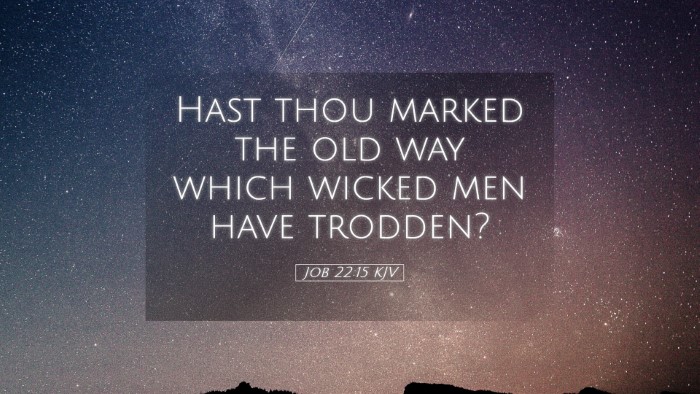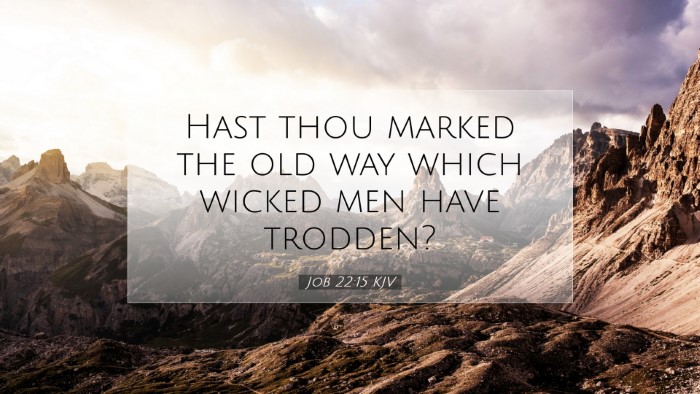Old Testament
Genesis Exodus Leviticus Numbers Deuteronomy Joshua Judges Ruth 1 Samuel 2 Samuel 1 Kings 2 Kings 1 Chronicles 2 Chronicles Ezra Nehemiah Esther Job Psalms Proverbs Ecclesiastes Song of Solomon Isaiah Jeremiah Lamentations Ezekiel Daniel Hosea Joel Amos Obadiah Jonah Micah Nahum Habakkuk Zephaniah Haggai Zechariah MalachiJob 22:15
Job 22:15 KJV
Hast thou marked the old way which wicked men have trodden?
Job 22:15 Bible Commentary
Bible Commentary on Job 22:15
Verse Text: "Will you keep to the old way that evil men have trod?" - Job 22:15 (NIV)
Introduction
Job 22:15 is a pivotal verse in the discourse between Job and his friends. In this passage, Eliphaz the Temanite addresses Job, challenging him about his way of life and his adherence to the traditional paths of righteousness. The statement serves as an accusatory question, reflecting the conventional wisdom of the time that equated suffering with personal sin.
Commentary Overview
This commentary draws from the insights of revered public domain scholars, including Matthew Henry, Albert Barnes, and Adam Clarke. Each commentary highlights the theological implications of the verse, the nature of the counsel offered by Eliphaz, and the broader context of Job's suffering and the response from his friends.
Insights from Matthew Henry
Matthew Henry emphasizes the tendency of humans to cling to established paths, particularly those that conform to societal norms. He notes that Eliphaz's question carries an implicit accusation that Job has deviated from the righteous way, which leads to his current suffering.
Henry further explains that the "old way" symbolizes the tradition of wisdom, yet he points out that traditions must be scrutinized against the truth of God's Word. He suggests that Job's friends have misunderstood the nature of divine justice. Instead of encouraging Job towards repentance, they push him deeper into despair by applying a formulaic understanding of sin and punishment.
Insights from Albert Barnes
Albert Barnes examines the rhetorical nature of Eliphaz's question. He argues that it highlights the erroneous belief that righteousness correlates directly with temporal blessings. According to Barnes, Job's situation contradicts this belief, as he is a righteous man suffering immensely.
Barnes notes that the reference to "evil men" serves to elevate Job's moral standing by contrasting him with those who genuinely live unrighteous lives. He warns against inferring that suffering is always a result of sin, thus calling into question the arguments presented by Job's contemporaries.
Insights from Adam Clarke
Adam Clarke's interpretation focuses on the implications of remaining obstinate in one's ways, as suggested by Eliphaz. Clarke asserts that sticking to traditional paths without questioning their validity can lead to spiritual stagnation. He elucidates that this passage urges careful examination of one’s beliefs and practices, especially in light of one’s circumstances.
Clarke also addresses the broader theme of divine providence and the mystery of suffering. He argues that the passage invites deep reflection on the character of God, emphasizing that understanding His ways is not always aligned with human logic.
Theological Implications
The discourse in Job 22:15 raises important theological questions regarding divine justice and human suffering.
- Questioning Tradition: The challenge posed to Job encourages a reevaluation of traditional beliefs. It indicates that faith must be informed by personal experiences and a deeper relationship with God.
- Understanding Suffering: This verse invites theologians to consider the complexities of suffering, which cannot be easily categorized as a punishment for sin.
- The Role of Counsel: The passage reflects on the nature of spiritual counsel. Eliphaz’s approach demonstrates how misguided counsel can exacerbate the suffering of others instead of bringing healing.
Pastoral Applications
For pastors, this verse serves as a reminder of the dangers of moralizing suffering. It underscores the importance of listening to the struggles of the faithful without rushing to judgment or applying simplistic answers.
- Empathy Over Judgment: Pastoral care should prioritize empathy, recognizing that each individual’s journey is unique and complex.
- Encouragement to Seek God: Encourage congregants to seek God personally in their trials rather than relying solely on traditional wisdom.
- Community Support: Foster a community where questions and doubts can be expressed without fear of condemnation.
Conclusion
Job 22:15 invites all believers to critically assess their understanding of God and suffering. Through the insights of Matthew Henry, Albert Barnes, and Adam Clarke, we see that the quest for truth is essential in navigating the intricacies of faith. By engaging deeply with scripture and the experiences of life, individuals can better align their paths with God’s will, understanding that He walks with us through both the trials and triumphs we face.


